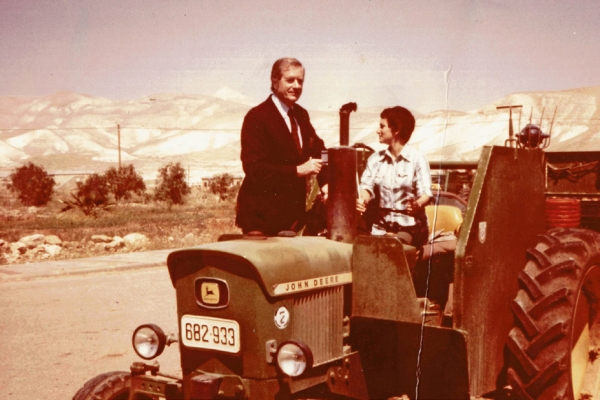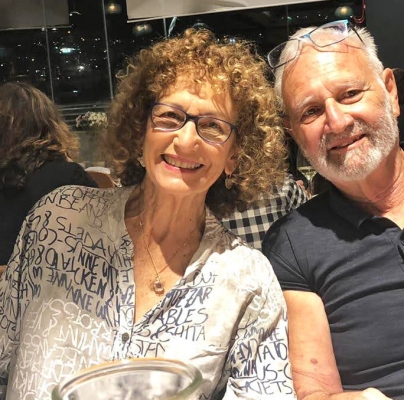Every Place on which the Soles of your Feet will Tread…
Not long ago, I was sitting in my daughter's living room on the moshav that I once called home. I wasn't paying much attention to the conversation she and my adult granddaughters were having, until one of them said something about a neighbor who is interested in becoming a committee chair on the moshav.
"But she's not a member of the moshav," I interject, with a mixture of surprise, a tinge of criticism, and, to my shame, anger.
"She will probably apply," my daughter says.
"But she lives here alone," I say in amazement mixed with protest. "She's divorced!"
"Things change, Ema. It's not your day anymore."
She's right. I should be elated. Instead, my eyes cloud with tears that I try to hide. I take deep breaths as quietly as possible. Be calm, I tell myself as the words "It's not fair!" reverberate through me.
She's divorced and can apply, but even though I was a full member, I was forced to leave?
I am stuck in the self-pity mode I've been in for forty-two years.
I made aliyah from America on my own in 1970 to become a pioneer. After seven months on a kibbutz ulpan program, I knew I wanted to live on a moshav, a cooperative agricultural setting, and not in the communal environment of a kibbutz. Not so easy.
"Only married couples can be accepted to moshavim," the Moshav Movement told me. "But we do have one new settlement near the border with Jordan that is accepting single people, because for the time being, it's really a kibbutz."
I joined. We lived in a temporary site, ate in our communal dining room, shared work in communal fields, and received a monthly stipend. It was perfect for me and all the post-army singles, everyone looking for a home and, of course, love. I found both.
Eventually, singles married and we were a community of couples and singles. When the permanent site was completed in1975, we became a moshav and families (and single men but not single women, who had to leave) moved into our own homes, worked our own fields, and created a community that was the envy of the area. But for me, the most significant part was that I belonged. I was a member of a community. The moshav was my identity, the confirmation of my identity as an Israeli. It validated my moving 9,000 miles away from my family. I was a pioneer who drove a green John Deere tractor, worked in the rich, red soil planting seed by seed, seedling by seedling, pulling out tenacious weeds, picking deep purple eggplants or our famous green table grapes as the sun rose over the purple hills of Moab. Sounds crazy, but I was in my twenties and already living my dream.
Until it was all taken from me.
When my husband and I divorced in 1980, I, the woman, had to pack up and leave. I, the woman, had to give up my rights to our home, land and the life I loved. My name was stricken from the Aguda – the cooperative. I lost my membership – and my sense of belonging.
In those days, a woman alone could not be signed on the deed of a farm on a moshav. When I left (I prefer my made-up phrase, "was lefted") the moshav in August 1980 with my daughters, it was more than a divorce, the separation of two lives that had been one. My entire existence was taken from me.
I lacked the deep connection to a community and the intensity of a commitment. I struggled with the guilt that I was no longer living the life of a pioneer, which had given meaning to my aliyah, with the fear that I was living here without making any real contribution to the building and development of Israel. I had no concrete Israeli identity. I didn't belong to any particular community. I floundered.
But I also succeeded. I developed a new career, I raised my daughters, I volunteered, I remarried years later. Yet, the fury and resentment from my loss remained with me until that evening in my daughter's home, sitting with the second and third generation of the moshav that I had started so long ago.
There was something in my daughter's voice, in that sharp comment, "It's not your day," that opened a small crack in wall of bitterness and led me to take a different perspective, to make a healthier analysis of the last fifty-two years of my life.
Like Yehoshua ben Nun, I was empowered, and found my mission near Jericho. The ancient city was only a twenty-minute drive from my moshav, as was the site of Gilgal where the mass circumcision reaffirming the Covenant with God took place. We used to shop in Jericho and had friends there. I even crossed the Jordan River (only halfway) a few times, though in the opposite direction from Yehoshua and Am Yisrael. But the awe of walking in these ancient sites remains embedded within me.
Like Yehoshua and the Israelites, my daughters and I did not stay in Bikat Hayarden, the Jordan Rift Valley. We moved on, going north to Nahalal to the agricultural high school where we dwelled for two years.
(Yehoshua 21:35) Dimnah with the open land around it, Nahalal and the open land around it; four cities.
We went south to Kibbutz Yad Mordechai, where we dwelled for four years.
(Joshua 13:3) From the Shihor, which is before Egypt, to the borders of Ekron northward, which is counted to the Canaanites; the five lords of the Philistines; the Gazathites, and the Ashdodites, the Ashkelonites, the Gittites, and the 'Ekronites; also the 'Avim.
We went to the Plains of the Sharon, where we dwelled for sixteen years.
(Isaiah 65:10) And the Sharon shall become a sheepfold and the Valley of Achor a place for cattle to lie, for My people who sought Me.
And now my husband, David, and I dwell on the edge of the Shomron. From our village's observation point, I can look east to my first home, north to the second, south to the third, west to the fourth. From this vantage point, I see that my identity has never changed. I am Israeli! I belong to the Jewish People, to the different communities in Israel where I have dwelled. I feel at home here, even though it's not the home I wanted so many years ago. Like the Tribes of Israel, I settled in many different areas of our Land.
Losing the farm and my community can still arouse resentment and bring tears I try to suppress, but I am thrilled that we are an evolving society that finally recognizes that a woman can become a member of a moshav or fight in a combat unit. What a coincidence that the combat unit where men and women fight side by side (60% are women) is called Arayot HaYarden, the Lions of the Jordan, since it is stationed in the Jordan Rift Valley, where the Israelites crossed over to the Promised Land, and where my moshav is located.
We change. We evolve. I am excited to see women in combat units and happy that a single woman can join "my" moshav. I have changed countries, names, husbands, professions, political parties… and homes. But one thing is clear to me: Home is anywhere in Israel, and I belong to all of it.
(Yehoshua 1:3) Every place on which the soles of your feet will tread I have given to you, as I have spoken to Moses.










Comments